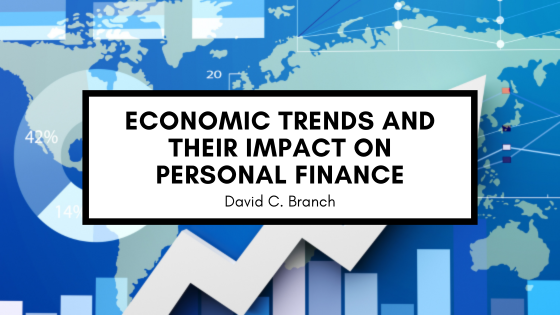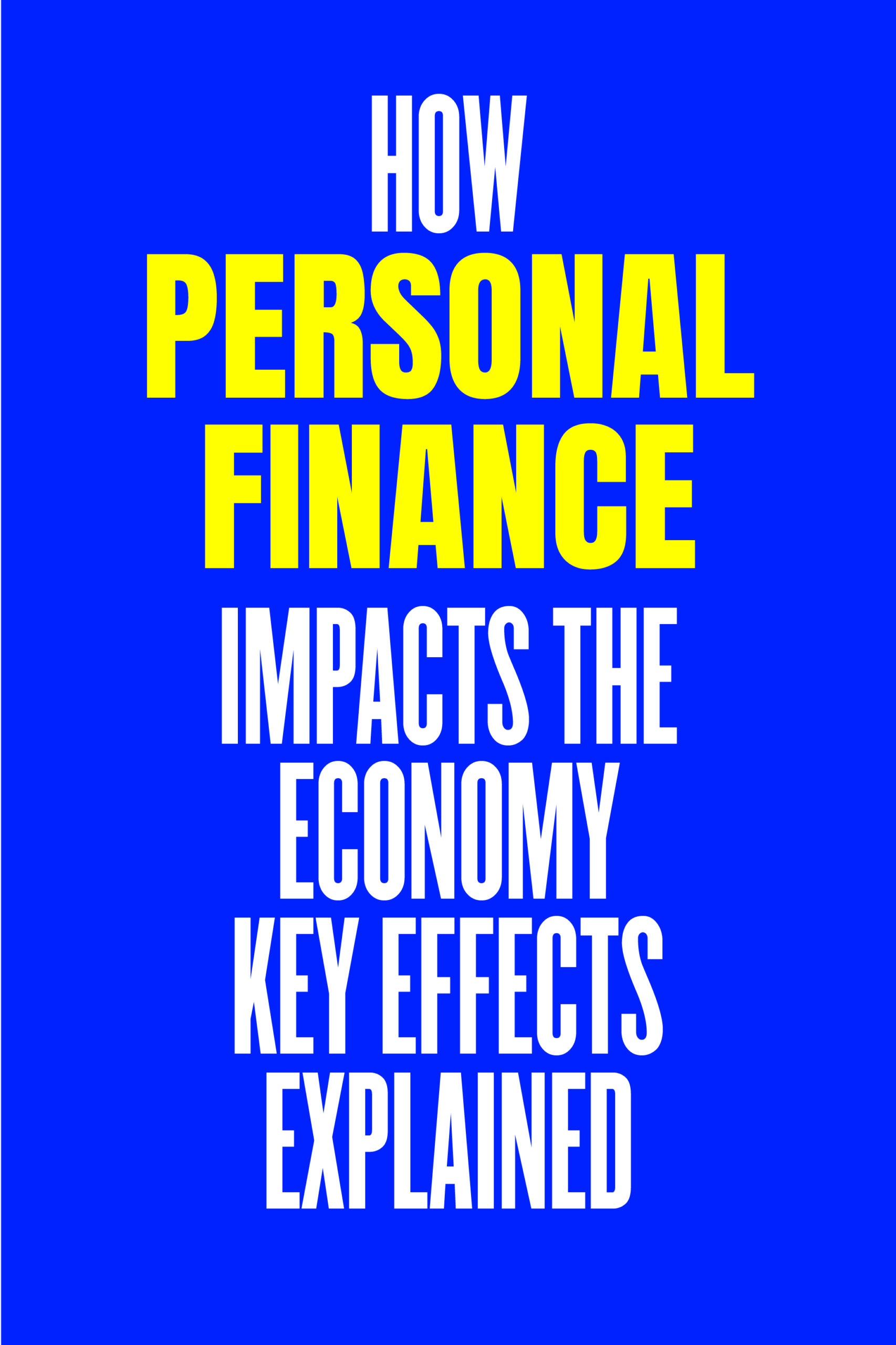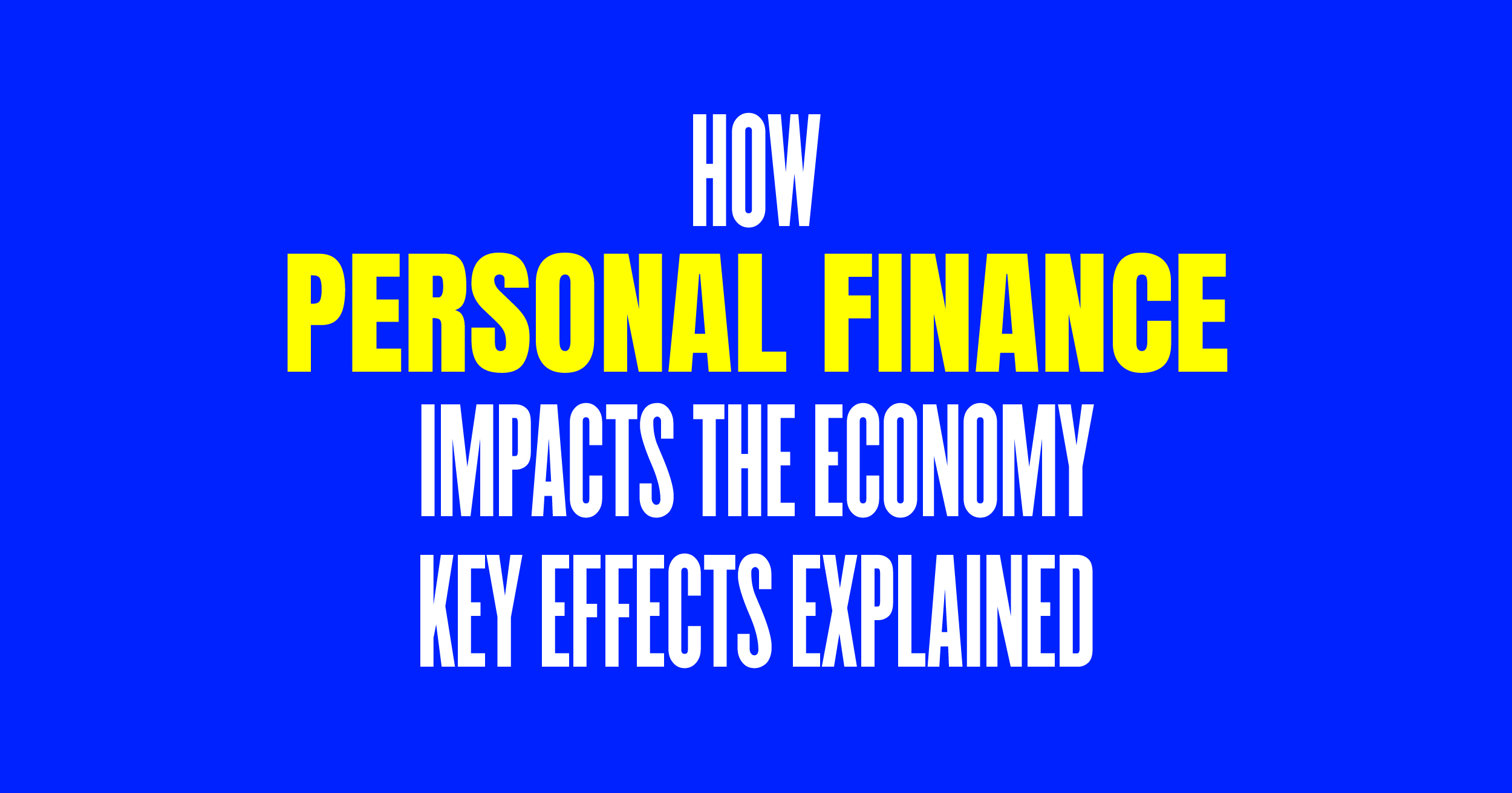Personal finance directly impacts the economy by influencing consumer spending and saving behaviors. These behaviors drive economic growth and stability.
Effective personal finance management ensures individuals make sound financial decisions. This leads to increased consumer confidence and spending, which boosts economic activity. People who save and invest wisely contribute to capital formation, supporting business expansion and job creation. Poor financial management, on the other hand, can lead to debt crises, reducing consumer spending and slowing economic growth.
Understanding personal finance helps individuals make informed decisions, fostering a stable and thriving economy. This interconnected relationship highlights the importance of financial literacy for both personal and economic well-being. The health of personal finances collectively shapes the broader economic landscape, making it crucial for economic stability.

Credit: davidcbranch.medium.com
Introduction To Personal Finance
Personal finance involves managing your money. This includes saving, investing, and budgeting. Understanding personal finance is crucial for financial health. It impacts every aspect of your life. Knowing how to manage your money helps you avoid debt and plan for the future.
Importance Of Personal Finance
Personal finance plays a significant role in daily life. Proper money management ensures you can pay bills on time. It also helps you save for emergencies and future needs. Good financial habits can lead to a comfortable retirement.
A strong grasp of personal finance can reduce stress. It provides a sense of security and peace of mind. Financial literacy is important for making informed decisions. These decisions can affect your quality of life and overall happiness.
Basic Concepts
Personal finance includes several key concepts. These concepts are essential for effective money management:
- Budgeting: Creating a plan for your income and expenses.
- Savings: Setting aside money for future needs.
- Investing: Putting money into assets to grow wealth.
- Debt Management: Handling loans and credit responsibly.
- Retirement Planning: Preparing financially for life after work.
Understanding these concepts can help you achieve financial stability. They are the foundation of personal finance.
| Concept | Description |
|---|---|
| Budgeting | Planning income and expenses. |
| Savings | Setting aside money for future needs. |
| Investing | Growing wealth through assets. |
| Debt Management | Handling loans and credit. |
| Retirement Planning | Preparing for life after work. |
Mastering personal finance is key to financial success. It helps you make the most of your money. By understanding and applying these concepts, you can secure a better future.
Consumer Spending
Consumer spending is a crucial part of the economy. It drives demand for goods and services. This spending influences the overall health of the economy. Let’s explore how consumer spending affects the economy.
Impact On Gdp
Consumer spending directly impacts GDP. It accounts for a large portion of GDP. When people spend money, businesses grow. This leads to job creation and higher income. More jobs and income mean more spending. It’s a positive cycle that boosts the economy.
Role In Economic Growth
Consumer spending plays a vital role in economic growth. High spending levels indicate a healthy economy. It encourages businesses to invest more. This leads to new products and services. Investment in new products fuels innovation. Innovation leads to more spending and growth.
| Consumer Spending | Economic Impact |
|---|---|
| Increased Spending | Boosts Business Growth |
| Job Creation | Higher Income Levels |
| Higher Income | More Consumer Spending |
Consumer confidence is also essential. When people feel secure, they spend more. This spending drives demand. Businesses respond to demand by expanding. Expansion creates more jobs. The cycle continues, leading to overall economic growth.
- Increased Spending: Boosts business revenue.
- Job Creation: Leads to higher employment.
- Higher Income: More money to spend.
Consumer spending affects many parts of the economy. It’s crucial for sustained economic growth.
Savings And Investments
Personal finance decisions have significant effects on the economy. One crucial aspect is how people save and invest their money. Savings and investments play a vital role in economic growth.
Capital Formation
When individuals save money, banks can lend it to businesses. This process is called capital formation. It helps businesses grow and creates jobs. More jobs mean more income for people. This cycle boosts the overall economy.
| Source of Savings | Impact on Capital Formation |
|---|---|
| Personal Savings | Provides funds for business loans |
| Corporate Savings | Invests in expansion and innovation |
Impact On Interest Rates
Savings and investments also affect interest rates. When people save more, banks have more money to lend. This can lead to lower interest rates. Lower rates make borrowing cheaper for businesses and consumers.
On the other hand, if people save less, banks have less money to lend. This can lead to higher interest rates. Higher rates make borrowing more expensive. This can slow down economic growth.
- High Savings: Lower interest rates, cheaper loans
- Low Savings: Higher interest rates, expensive loans

Credit: m.economictimes.com
Debt And Borrowing
Debt and borrowing play a crucial role in personal finance. They can have a significant impact on the overall economy. Understanding this relationship helps individuals make informed financial decisions.
Household Debt Levels
Household debt levels refer to the amount of money that families owe. This can include mortgages, credit cards, car loans, and student loans.
High levels of household debt can lead to financial stress. Families may struggle to pay their bills. This can reduce their spending on other goods and services.
| Type of Debt | Percentage of Total Household Debt |
|---|---|
| Mortgage Debt | 65% |
| Credit Card Debt | 15% |
| Student Loans | 10% |
| Auto Loans | 10% |
High household debt can also affect credit scores. Lower credit scores can make borrowing more expensive. This creates a cycle of more debt and financial strain.
Influence On Financial Markets
Personal borrowing affects financial markets. Lenders provide loans based on the demand from borrowers. If many people borrow, lenders can charge higher interest rates.
High borrowing can lead to increased interest rates. This makes borrowing more expensive for everyone. It can also reduce investments in other areas, like stocks and bonds.
- Increased Interest Rates: Borrowing costs more.
- Reduced Investments: Less money in stocks and bonds.
- Economic Slowdown: Less spending and investing.
Personal finance and the economy are closely linked. Understanding this can help individuals make better financial choices.
Income And Employment
Understanding the relationship between income and employment is key to grasping how personal finance impacts the economy. A healthy job market and fair wages contribute positively to economic growth.
Job Creation
Job creation is vital for economic stability. When businesses expand, they hire more people. This reduces unemployment rates and increases the overall spending power of households. Higher employment levels lead to more consumer spending, which stimulates economic growth.
Wage Dynamics
Wage dynamics play a crucial role in personal finance. Higher wages mean more disposable income. This boosts savings and investments. When people save and invest more, they contribute to economic development. Fair wages also lead to better living standards. This, in turn, results in a more productive workforce.
- Higher wages lead to increased spending.
- Fair wages improve living standards.
- Job creation reduces unemployment.
Consider the following table illustrating the impact of wage increases on the economy:
| Wage Increase (%) | Consumer Spending (%) | Economic Growth (%) |
|---|---|---|
| 1% | 0.8% | 0.5% |
| 3% | 2.4% | 1.5% |
| 5% | 4.0% | 2.5% |
As shown in the table, even small wage increases can have a significant impact on consumer spending and economic growth.
:max_bytes(150000):strip_icc()/FinancialLiteracy_Final_4196456-74c34377122d43748ed63ef46a285116.jpg)
Credit: www.investopedia.com
Inflation And Purchasing Power
Inflation measures how prices rise over time. It affects everyone. When prices go up, your money buys less. This is called purchasing power. Personal finance decisions play a big role. They impact how people deal with inflation.
Consumer Price Index
The Consumer Price Index (CPI) tracks changes in prices. It looks at a basket of goods and services. These include food, clothes, and housing. A rising CPI means higher costs for these items. This signals inflation.
Families feel the pinch. They spend more on the same goods. Less money is left for savings or other expenses. The CPI directly affects everyone’s budget. It shows how much more you need to spend each month.
Impact On Cost Of Living
Inflation impacts the cost of living. When prices rise, living costs go up. People need more money for the same lifestyle. This is tough for those with fixed incomes. They may struggle to cover basic needs.
Here’s how it breaks down:
- Food: Groceries become more expensive.
- Housing: Rent or mortgage payments may increase.
- Utilities: Bills for water, gas, and electricity can rise.
- Transportation: Gasoline and public transport costs can go up.
| Item | Before Inflation | After Inflation |
|---|---|---|
| Groceries | $200 | $220 |
| Rent | $800 | $850 |
| Utilities | $150 | $160 |
| Transportation | $100 | $110 |
These changes affect every household. Understanding inflation helps you manage your money better. It prepares you for higher living costs.
Government Policies

Government policies play a key role in personal finance and the economy. They set rules and guidelines that affect how money flows. Let’s explore two significant areas of government policies: Taxation and Spending and Monetary Policy.
Taxation And Spending
Taxation affects how much money people have. Higher taxes mean less money to spend. Lower taxes give people more spending power. Government spending also impacts the economy. When the government spends on infrastructure, it creates jobs. More jobs mean people have more money to spend. This spending boosts the economy.
Monetary Policy
Monetary policy controls the money supply. The central bank manages this policy. It uses tools like interest rates. Lower interest rates make borrowing cheaper. People and businesses borrow more and spend more. This increases economic activity. Higher interest rates make borrowing expensive. People and businesses borrow less and spend less. This slows down economic activity.
| Policy Tool | Effect on Personal Finance | Effect on Economy |
|---|---|---|
| Taxation | Reduces or increases disposable income | Slows or boosts economic activity |
| Government Spending | Creates jobs and increases income | Boosts economic growth |
| Interest Rates | Changes borrowing costs | Influences spending and investment |
Financial Literacy
Financial Literacy is understanding how to manage your money. It includes knowing how to save, invest, and spend wisely. Financial literacy helps people make better financial decisions. This understanding is crucial for both individuals and the economy.
Education Initiatives
Schools teach children about money management. Programs aim to include financial lessons in the curriculum. These initiatives help students understand the value of money. Financial education can start as early as elementary school. Learning about budgeting and saving can create smart financial habits.
Community centers often provide free financial literacy workshops. These workshops cover topics like credit scores, loans, and investments. By attending, adults can improve their financial knowledge. Libraries also offer resources and classes on personal finance. These education initiatives help people of all ages become financially savvy.
Long-term Economic Benefits
Financially literate people make better financial decisions. They save more, avoid debt, and invest wisely. This leads to a more stable and prosperous economy. When people manage their money well, they can handle financial crises better. This reduces the strain on social welfare systems.
Financial literacy encourages entrepreneurship. People with financial knowledge are more likely to start and sustain businesses. This creates jobs and stimulates economic growth. A financially literate population is key to a healthy economy.
| Aspect | Benefit |
|---|---|
| Saving | More funds for emergencies |
| Investing | Increased wealth |
| Debt Management | Reduced financial stress |
- Strong Financial Habits: People save and invest money.
- Economic Stability: Less reliance on social welfare.
- Job Creation: More entrepreneurs start businesses.
Financial literacy is a key factor in economic health. Educating people about money management benefits everyone. It creates a cycle of prosperity and stability.
Frequently Asked Questions
How Does Finance Affect The Economy?
Finance drives economic growth by facilitating investments, creating jobs, and enabling consumer spending. It supports business expansion and innovation.
How Does Personal Spending Affect The Economy?
Personal spending boosts economic growth. It increases demand for goods and services. Businesses then hire more workers. This reduces unemployment. Higher employment leads to more spending. This cycle stimulates the economy.
What Is The Impact Of Personal Finance?
Personal finance impacts financial stability, reduces stress, and improves decision-making. It helps achieve goals, build wealth, and secure retirement.
How Do Financial Choices Impact The Economy?
Financial choices influence the economy by affecting consumer spending, investment levels, and business growth. They shape inflation, employment rates, and overall economic stability. Effective financial decisions can stimulate economic growth, while poor choices may lead to recessions.
Conclusion
Personal finance plays a crucial role in shaping the economy. Responsible spending and saving boost economic stability. Individual financial health can drive national growth. Managing personal finances wisely helps create a resilient economy. Understanding personal finance impacts economic well-being for all.
Foster good financial habits to support broader economic prosperity.

